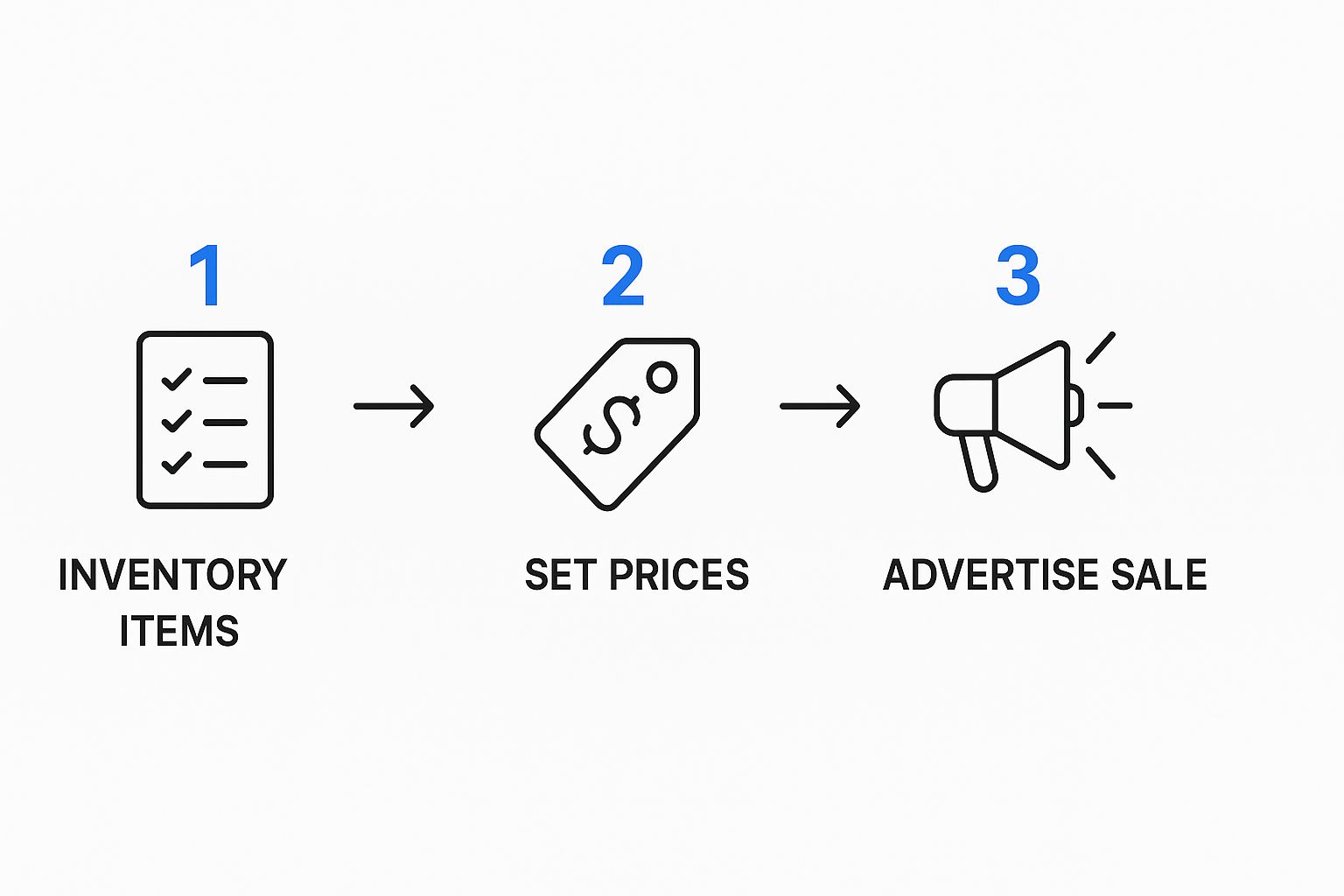Whats an Estate Sale? How They Work & Tips to Find Treasure

So, what exactly is an estate sale? Picture this: an entire home's contents are turned into a pop-up shop for a weekend. That's the essence of it. It’s the process of selling almost everything a person owns, usually held right inside their own house after a major life event.
Unlike your typical garage sale, this is a complete liquidation of a lifetime's worth of belongings.
What an Estate Sale Really Is

Think of it as a giant, public tag sale, but the scope is way bigger than a weekend decluttering project. The term "estate" can throw people off—it doesn't mean the person was wealthy. It simply refers to the total property and belongings of an individual, no matter how modest.
These sales are usually prompted by significant life changes, like a death in the family, downsizing for retirement, or a big cross-country move. The goal is simple: sell off the majority of a home's contents efficiently, often over just two or three days. You'll find everything from high-end furniture and art to everyday kitchen gadgets and tools.
An estate sale is a specialized event designed to liquidate the belongings of someone who is downsizing or has passed away. It includes most of their possessions and is typically held right inside their home.
To give you a better sense of where an estate sale fits in, here's a quick comparison.
Estate Sale vs Garage Sale vs Auction
| Sale Type | Scope of Items | Primary Reason | Typical Location |
|---|---|---|---|
| Estate Sale | An entire household of belongings | Life transition (death, downsizing) | Inside the person's home |
| Garage Sale | Unwanted items and clutter | Decluttering or spring cleaning | Driveway, garage, or yard |
| Auction | Specific items, often high-value | Quick sale, competitive bidding | Varies: online, auction house, on-site |
This table shows how an estate sale is truly a unique event, distinct from other common ways of selling personal items.
The Scale of an Estate Sale
The sheer volume of items is what really sets an estate sale apart. A yard sale might have some old clothes and a few pieces of furniture, but an estate sale offers a complete snapshot of a person's life. This could include:
- Furniture: Sofas, dining sets, bedroom suites, and unique antique pieces.
- Collectibles: Coins, stamps, vinyl records, and rare books.
- Artwork: Paintings, sculptures, and various decorative items.
- Household Goods: Kitchen appliances, tools, linens, and garden supplies.
The average estate sale can bring in some serious cash, often between $10,000 to $50,000 or even more, all depending on the value of what's for sale. You can get more insights on the market from experts like J.P. Morgan.
The entire process of turning these personal assets into cash is often called estate liquidation, and it's a powerful strategy for handling a major life transition.
Why Do People Have Estate Sales, Anyway?
Behind every estate sale, there's a big life story unfolding. Most people think these sales only happen after someone passes away, but that’s just one part of the picture. At its core, an estate sale is simply a tool for navigating a major life change. It’s the most effective way to sell off nearly everything in a house, all at once.
The most common trigger is, in fact, settling the estate of a loved one. When family members are left to clear out a home, a professionally managed sale can be a lifesaver, easing the emotional and logistical weight during an already tough time. But plenty of other situations call for a full-scale home liquidation.
It's All About Life Transitions
Downsizing is another huge reason. When seniors decide to move into a smaller home, an assisted living facility, or a retirement community, they simply can't take a lifetime of accumulated belongings with them. An estate sale is a practical way to turn those assets into cash for their next chapter while giving their cherished items a new life.
Other major life events often lead to an estate sale, too:
- Moving: A big cross-country or international job relocation can make it ridiculously expensive to haul all your household goods. Sometimes, selling it all and starting fresh is the easiest and smartest financial move.
- Divorce: When a marriage ends, shared assets need to be liquidated so the proceeds can be split. An estate sale provides a transparent, organized process for selling off the contents of the marital home.
- Financial Distress: In tough situations like bankruptcy or foreclosure, selling personal property becomes a necessity to handle outstanding debts.
Ultimately, an estate sale is a practical solution for people in the middle of a profound change. It gives families a structured way to close one chapter and offers buyers a chance to find unique, pre-loved items with a story.
Once you understand what prompts an estate sale, you see its real purpose. It’s not just about selling stuff—it’s about helping people move on to the next stage of their life with a clean slate and peace of mind.
Who Manages an Estate Sale?

Pulling off an estate sale is a massive undertaking, and it's worlds away from a simple weekend garage sale. The job demands a unique mix of appraisal knowledge, marketing instincts, and serious crowd-control skills.
Given the sheer scale of the work—not to mention the emotional weight that often comes with it—most families decide to bring in a professional to manage the entire process.
The go-to solution is hiring a professional estate sale company. These teams are the project managers of the liquidation world, handling every single detail from start to finish. Their job is simple: get the most money for the estate's belongings while taking all the stress off the family's shoulders.
For a few days, a professional team essentially turns a private home into a well-organized, secure pop-up retail shop. But it's about a lot more than just slapping price tags on items.
The Role of an Estate Sale Company
When you hire a pro, you're not just getting a cashier. You're getting a comprehensive service designed to make the sale a success.
Here's what they typically handle:
- Appraisal and Pricing: Their experts know how to evaluate everything from antique furniture and fine china to everyday kitchen gadgets, ensuring you get fair market value.
- Staging and Organization: They sort through, clean, and artfully arrange thousands of items, creating a shopping experience that encourages people to buy.
- Marketing and Promotion: The company gets the word out, advertising the sale to their network of dedicated buyers, local collectors, and the general public using online listings, social media, and email blasts.
- Sale Management: During the event, they provide staffing, manage every transaction, and keep a close eye on security to protect the home and its contents.
- Post-Sale Cleanout: Once the sale is over, they deal with whatever is left. Depending on your contract, this could mean arranging for donations, a final buyout, or disposal.
You can expect a professional company to charge a commission, usually between 30% to 40% of the total sales. Some may also have added fees for extra services like junk hauling or deep cleaning.
Can a Family Run an Estate Sale Themselves?
While it’s definitely possible for a family to run their own sale, it is a monumental task. The main upside is saving on the commission fee, but that "savings" comes at a huge cost in time, physical energy, and emotional strain.
If you go the DIY route, you're responsible for researching prices on countless items, figuring out how to market the sale, and then managing crowds of strangers walking through the home. It's incredibly easy for someone without experience to underprice valuable antiques or overprice common goods, which ultimately means less money in your pocket and a house still full of stuff.
For most people, paying the professional commission is a small price for the peace of mind and better financial outcome they provide.
The Estate Sale Process From Start to Finish
Turning a lifetime of belongings into a well-organized sale doesn’t just happen. Professional estate sale companies have a tried-and-true process that’s designed to get the most value out of a home’s contents while keeping stress low for the family. You can think of it as a carefully managed project with clear, distinct phases.
It all kicks off with an initial consultation. This is where the company sits down with the family to really understand their needs, get a feel for the items in the home, and walk them through how everything works. Once a contract is in place, the real hands-on work begins. This means a full-blown inventory and appraisal, where every single item is cataloged, researched, and given a fair market value.
Staging and Pricing the Home
Next up is staging and pricing. This is the part where the house is transformed into a pop-up retail shop. The team gets to work organizing, cleaning, and artfully arranging everything to create an environment that’s easy and inviting for shoppers to navigate.
Then, every single item gets a price tag. This isn't just guesswork; it's a careful balance. Pricing strategies rely on hard data from recent sales, what similar items are going for online, and auction results. To draw in buyers, items are often priced at 30-70% of their original retail value. Getting this right is critical, especially since around 70% of estate sales happen after a death, making an efficient sale a key part of settling the estate.
The infographic below breaks down the key prep steps that turn a home's contents into a market-ready event.

As you can see, inventory, pricing, and advertising are the three pillars holding up a successful sale.
Managing the Sale and Post-Sale Logistics
With everything staged and tagged, the focus shifts to marketing. The company will get the word out through their email lists, social media channels, and specialty estate sale websites to make sure a big crowd shows up on sale day.
Then, it's showtime. The sale itself usually runs over a two- or three-day weekend, and the company’s staff manages the whole thing. They answer customer questions, keep the flow of people moving smoothly through the home, and handle all the payments.
A common strategy to sell as much as possible involves planned discounts. Day one prices are usually firm. By day two, you might see a 25% reduction, and on the final day, prices could be slashed by 50% or more.
Finally, when the last shopper has left, the process wraps up with the post-sale cleanout. The team deals with whatever is left behind. Depending on the agreement, this can involve a few different things:
- Arranging for unsold items to be donated to charity.
- Coordinating a bulk buyout with a liquidator.
- Managing a total cleanout to leave the property completely empty.
This final step brings closure for the family, leaving the home clear and ready for whatever comes next. If you're thinking about tackling this on your own, our guide on how to run an estate sale is packed with detailed steps and tips.
How to Navigate an Estate Sale Like a Pro

Walking into your first estate sale feels a bit like a treasure hunt. To come out a winner, you need a game plan. The best strategy starts before you even leave home: always check the online sale listing for photos. This lets you scout the most interesting pieces ahead of time so you can make a beeline for them once the doors open.
If you want the best selection, arriving early is non-negotiable, especially on the first day. Don't be surprised to find a line—it's just part of the culture. Many pros show up at least 45 minutes before opening to secure a good spot.
Understanding the Rules of the Day
Once you're inside, remember you’re a guest in what was once someone's home. Pay attention to any posted rules about how to pay, where to put sold stickers, or which areas are roped off. A little respect goes a long way.
The most successful shoppers are both strategic and respectful. They understand that while it’s a sale, it’s also a sensitive event. Kindness toward staff and other shoppers creates a better experience for everyone involved.
Negotiating is often part of the fun, but timing is everything. Most companies hold firm on prices the first day. You'll usually see discounts pop up on day two, with deeper price cuts on the final day. To really sharpen your skills, you can dig into these powerful estate sale tips and level up your strategy.
Here are a few quick etiquette points to remember:
- Handle with Care: These items are often fragile antiques. Treat them gently. If you break it, you bought it—that's the general rule.
- Respect Piles: See a stack of goodies near the checkout? Leave it be. That’s another shopper's "maybe" pile, and it's considered bad form to poach from it.
- Be Patient: Homes get crowded, fast. Wait your turn to squeeze into small rooms and avoid pushing. A calm approach will help you spot those hidden gems others might miss.
Common Questions from the Estate Sale Floor
Even with a good handle on the basics, you probably still have a few questions about how an estate sale really works. That’s perfectly normal. Whether you're a seasoned shopper or a family thinking about hosting a sale, a little insider knowledge goes a long way.
Let's clear up some of the most common things people wonder about.
Is Everything in the House Actually Up for Grabs?
One of the first things shoppers ask is, "Is this for sale?" The short answer is: almost everything you see, but with a few key exceptions.
Before any sale opens its doors to the public, the family will have gone through and set aside deeply personal items. Think family photos, private documents, and irreplaceable heirlooms. Anything not for sale is usually moved into a locked room or clearly labeled with a "Not For Sale" tag. When in doubt, just find a staff member and ask—they'll be happy to clarify.
What's the Deal with Pricing and Haggling?
This is a big one. Price negotiation really depends on the company running the sale and what day it is.
As a general rule, prices are firm on the first day. This gives everyone a fair shot at the most sought-after items at their marked price. But as the sale progresses, discounts almost always kick in.
It's common to see markdowns like 25% off on the second day, with prices dropping to 50% off or more by the final day. Some companies might entertain reasonable offers on big-ticket items, but always be respectful and check for posted rules on negotiating.
What Happens to Everything That Doesn't Sell?
It's rare for an entire house to sell out completely, so what happens to the leftovers?
The plan for unsold items is decided between the family and the estate sale company from the very beginning. Typically, there are three main routes: the remaining goods are donated to a charity for a tax write-off, a buyout company purchases the entire lot for a lump sum, or a cleanout service is brought in to completely empty the property.